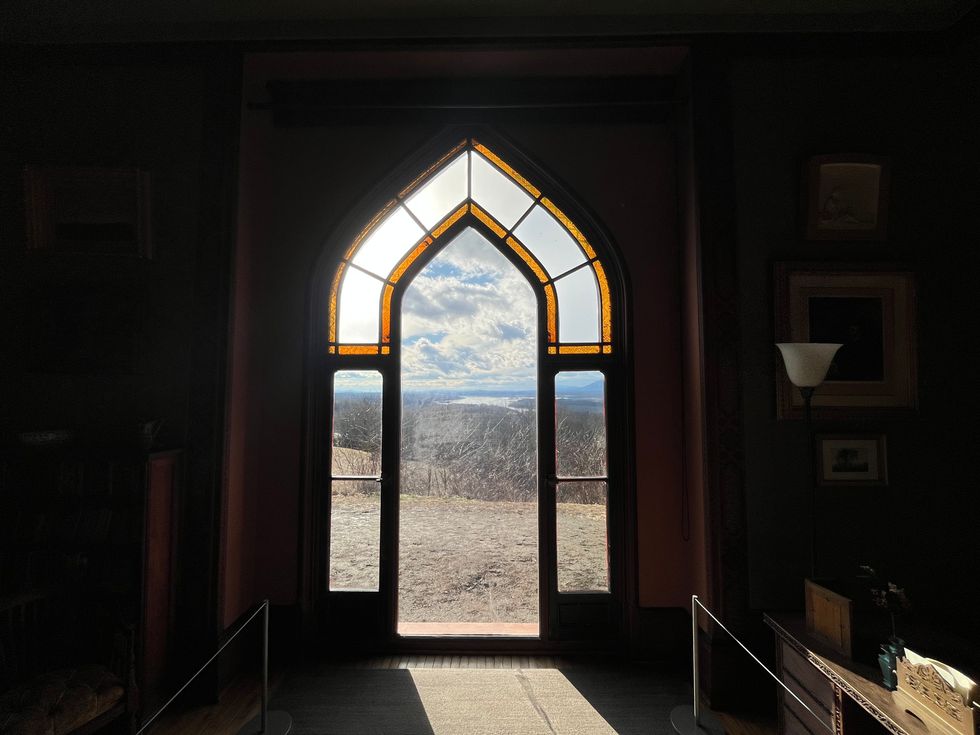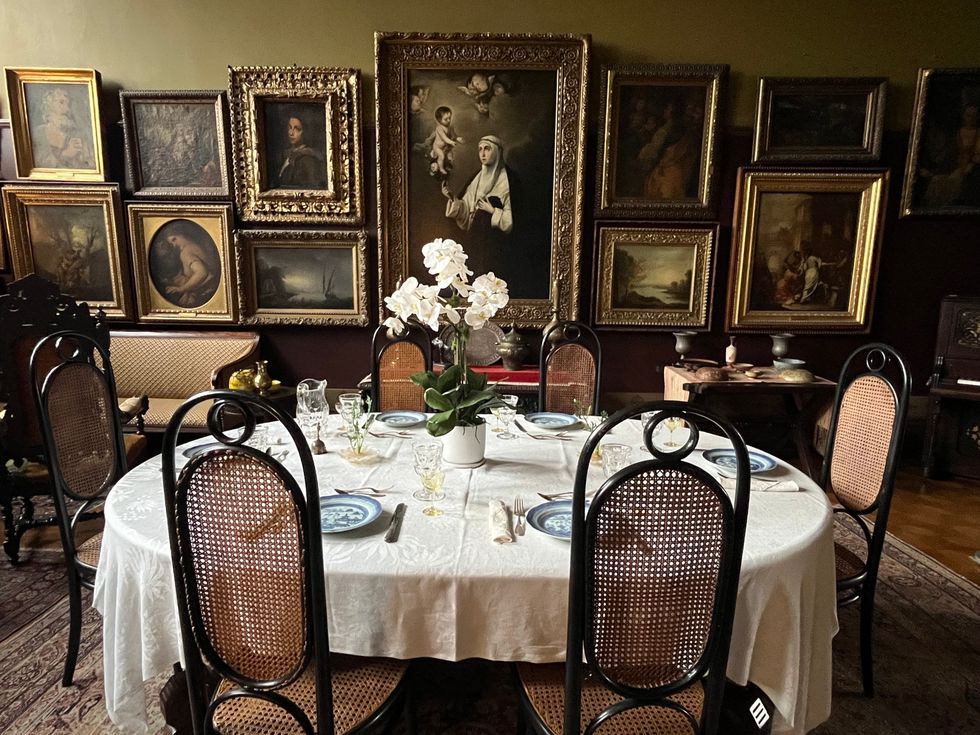Mountainside hotline saves people in crisis

Mountainside Treatment Center is located on Route 7 in North Canaan.
Provided

Mountainside Treatment Center is located on Route 7 in North Canaan.
“Addiction isn’t a choice, but recovery can be.”
—John Jones, vice president of crisis support at Mountainside Treatment Center
NORTH CANAAN — Matt spent several years wrestling with fear, frustration and uncertainty about how to intervene in his wife’s long-term addiction to alcohol. The past six to eight months, he recalled, had been especially hellish.
“It got so bad that I told her, you are either going to die or get better.”
Dying, he said, was not an option. Placing a call to the Mountainside Treatment Center’s crisis intervention team was.
For families like Matt’s, National Recovery Month in September brings a message of hope: recovery is possible, and help is closer than many realize.
This month, Mountainside, a nationally accredited addiction treatment center with a facility in North Canaan, is taking that message nationwide with the launch of a recovery outreach initiative that gives loved ones a direct way to connect someone with support.
At the heart of the effort is a dedicated hotline and confidential referral system, a temporary initiative that allows concerned family members to submit the name of someone they believe is struggling with alcohol or substance misuse.
From there, a trained member of the Mountainside Crisis Intervention Team (MCIT) will proactively reach out to that person, offering not judgment, but compassion, understanding and a pathway to treatment.
“Nearly 70% of the people we treat are referred by someone close to them,” according to Jana Wu, a licensed master social worker at Mountainside.
Referring to the dedicated hotline and referral system, “This initiative embraces that reality and provides a structured, accessible way for people to act out of love and concern,” she added.
Meeting people where they are
Mountainside’s initiative aims to bridge that gap by shifting the focus from waiting for the individuals to seek treatment to actively reaching out when someone is identified as being at risk.
Depending on the situation, support may come through Mountainside’s own programs or through a referral to a trusted partner, such as Northwell Behavioral Health, the largest not-for-profit health system in the Northeast, serving more than three million residents of New York and Connecticut annually.
Dr. Manassa Hany, director for the Division of Addiction Psychiatry at Northwell’s Zucker Hillside and South Oaks’s hospitals, emphasized that many individuals facing addiction are unable, or unwilling, to seek help on their own.
“This service empowers loved ones to take that first step, potentially saving lives,” Hany noted.
“I needed help in getting her to accept that she needed help,” Matt said of his wife’s situation. “Most of the time, they are active in their addiction and don’t want to get out of it. It’s where they want to be.”
Matt said his relationship with Mountainside spanned several years. “Addiction is a difficult thing to beat, even if there are periods of sobriety,” he said. The longer the misuse continues the harder it is to stop.
That’s when things can get “very dramatic, very quickly,” he noted. “With alcohol, they cannot go cold turkey when fighting their addiction.”That’s when counseling becomes critical.
“They counter all the denial,” Matt said of Mountainside’s intervention team, including beliefs like, “I just need to taper off…or I am going to switch from vodka to beer.”
“They can’t stop drinking by drinking,” said Matt. “It doesn’t work.”
‘They speak from the heart’
Too often, according to members of Mountainside’s crisis intervention team, people battling addiction feel isolated or ashamed. This program lets families step in and quietly say that they see you struggling and they care.
Sometimes, as in Matt’s case, it takes tough love, and trust in the dedicated Mountainside Crisis Intervention Team, many of whom have themselves battled demons in their past before embracing sobriety.
“They speak from the heart and speak the truth. The kind of assistance they give you is very personal,” Matt explained. “When you’re in the caretaker role, you are going to do the best that you can do,” to take the pain away from your loved one, even if it empowers the addiction. “That’s when the professionals step in and say, ‘How has that been working for you?’” Matt explained.
The moral and professional support he has received is immeasurable. “Whenever I call, he is there,” Matt said of his family’s counselor. “He came over at 8 in the morning many times and calls me at 7 p.m. to check in.”
A crisis by the numbers
The need for crisis intervention support is staggering. According to a 2023 report by the National Survey on Drug Use and Health, more than 54 million Americans age 12 and older needed treatment for a substance use disorder.
Fewer than one in four actually received it.
Young people are among the most affected. Nearly 3 million adolescents needed treatment in 2023, but fewer than four in 10 received help. Among young adults, the survey revealed, the numbers are even more alarming: almost 10 million needed care, yet only 18% accessed it.
Behind those statistics are stories like Matt’s, families wrestling with fear, frustration and uncertainty about how to intervene.
“Addiction is a family disease,” noted Matt, who admitted that it takes a ton of tough love to help a loved one facing a downward spiral.
‘Recovery is REAL’
This year’s Recovery Month theme, set by the Substance Abuse and Mental Health Services Administration (SAMHSA) is “Recovery is REAL.” It is a simple, powerful reminder that no matter how desperate circumstances may seem, people do recover, and millions already have.
After seeking and receiving support from the Mountainside Crisis Intervention Team, for both himself as caretaker and for his wife’s addiction, Matt reported that she is on her recovery journey.
“Addiction isn’t a choice, but recovery can be,” said John Jones, Vice President of Crisis Support at Mountainside. “If we can help someone make that choice during this important month, it could change everything.”
If someone you care about is struggling with substance misuse, help is just a call, or click, away.
To connect with Mountainside’s Crisis Intervention Team call (860) 431-8755. A confidential referral form is available at www.mountainside.com.
Matt’s surname was omitted to preserve the anonymity of the recovery program.
John Harney, president of the Salisbury Housing Trust, presents Jocelyn Ayer, executive director of the Litchfield County Centers for Housing Opportunity, center, and U.S. Rep. Jahana Hayes, 5th District, with local maple syrup. Hayes was in Salisbury Thursday to tour one of the trust’s latest houses on Perry Street.
SALISBURY — Congresswoman Jahana Hayes (D-5) admired the kitchen cabinets, the sunlight streaming through the large windows and an airy room well suited for flexible living space.
She toured the new affordable home at 17 Perry St. on Thursday, Jan. 29. The house, recently completed by the Salisbury Housing Trust, is awaiting a family to call it home. The modular home is one of four erected in Salisbury through the Litchfield County Center for Housing Opportunity’s Affordable Homeownership Program for scattered sites. Houses were also built in Norfolk, Cornwall and Washington.
Jocelyn Ayer, director of the center, joined members of the housing trust and First Selectman Curtis Rand in welcoming Hayes and explaining how the project came together. Rand said the property was the site of a dry-cleaning establishment located in the center of a residential area. “It was owned by two people who walked away from it. It took 15 years before we took the initiative to do something. We didn’t want to foreclose until we were sure we had someone to share in the cleanup.”
That partner was the state Department of Economic and Community Development, which provided a grant. Once the contamination was abated, a process that took five years, the town gave the property to the trust.
Hayes commended the town, saying, “I’m surprised you took the risk.”
Ayer said the critical pieces in making the project happen were the town donating the land and the Planning and Zoning Commission approving two homes on the Perry Street lot. She also thanked Hayes for her support in securing some federal funding toward the project.
“Other towns are jealous of the support we have here,” Ayer told Hayes, which includes help from the town, state and federal government.

Each of the houses costs $250,000. The trust retains the land on which they sit. The cost to build each house was $500,000, said Ayer. So far, two of the four Salisbury homes are occupied. Those eligible must be first-time homeowners.
Heat is provided by mini-split units in each room. The houses run on electricity and Ayer said the trust is exploring solar options. “We have $40,000 for each house, but we’re having a hard time getting bids near that.”
Jennifer Kronholm Clark, vice president of the trust, described the families who are already occupying the two houses. Just next door at 19 Perry St. is a young family with two children, one born recently. The mother grew up in Salisbury and “this is a wonderful opportunity for her to raise her children where she was raised. It’s a beautiful story.”
The family in one of the Undermountain Road houses has three boys who are thrilled to have a playground practically in their front yard, said John Harney, president of the trust. When the town conveyed that parcel, it stipulated that the existing playground remain.
Even with the $250,000 price tag, which is considered affordable in today’s housing market, Ayer said there has been a lot of interest expressed, but many just cannot afford to buy because they are unable to secure a mortgage. Hayes noted the guidelines have to be adjusted, adding that while affordable housing has always been an issue, “it’s getting to the top of the priority list.”
She lauded Ayer for all the work she does to promote affordable housing, telling her “You have a great vision. I’ll keep going to bat for you. I’ll keep trying to get federal money.”
As she was about to leave, Hayes was presented by Harney with what he called “liquid gold” — maple syrup made by Dolores and Champ Perotti of East Canaan. He also had a bottle for Ayer.
Those who may be interested in applying for the homeownership program should contact Ayer at 203-579-3180.
A judge recently dismissed one lawsuit tied to the proposed redevelopment, but a separate court appeal of the project’s approval is still pending.
LAKEVILLE — A Connecticut Superior Court judge has dismissed a lawsuit filed against Salisbury’s Planning and Zoning Commission challenging a zoning amendment tied to the controversial expansion of the Wake Robin Inn.
The case focused on a 2024 zoning regulation adopted by the P&Z that allows hotel development in the Rural Residential 1 zone, where the historic Wake Robin Inn is located. That amendment provided the legal basis for the commission’s approval of the project in October 2025; had the lawsuit succeeded, the redevelopment would have been halted.
The decision, issued Jan. 29 by the Superior Court in Torrington, rejected a claim brought by Wells Hill Road residents Angela and William Cruger seeking to nullify the amendment. The Crugers filed the lawsuit in March 2025, arguing the regulation was improperly adopted and amounted to illegal spot zoning intended to benefit the project’s developer, Aradev LLC.
The zoning amendment drew scrutiny when it was adopted, with opponents asserting it was crafted specifically to enable the Wake Robin Inn project. Town officials and land use staff, however, repeatedly said the change was years in the making and intended to address zoning nonconformities affecting historic inns throughout Salisbury.
In a memorandum of decision, the court found the plaintiffs failed to meet their burden of proof that proper notification was lacking. The judge wrote that “a close examination of the record” showed the Crugers did not demonstrate that public notice of the zoning change was procedurally deficient, unduly vague or untimely filed.
The dismissed case is the first of two legal challenges filed by the Crugers related to the Wake Robin Inn redevelopment. A second lawsuit — an appeal of the P&Z’s approval of Aradev’s application to redevelop and expand the inn — remains pending before the court.
Former Planning and Zoning Commission Chair Michael Klemens said that Thursday's ruling brought vindication. In a Jan. 30 email to the P&Z and commission attorney Charles Andres, Klemens said the lawsuit was largely based on claims that he and Land Use Director Conroy had misled the public and the commission during the regulatory process.
“So not only are the regulations recognized by the Superior Court as legally adopted,” Klemens wrote, “but the aspersions cast upon the integrity of staff and your immediate past chair are hopefully finally put to rest.”
Andres informed the Land Use Office and current P&Z Chair Cathy Shyer that the Crugers have 20 days to challenge the court’s ruling.
Under the approved plan, Aradev would redevelop the Wake Robin Inn to include a new detached 2,000-square-foot cabin, event space, a sit-down restaurant and fast-casual counter, as well as a spa, library, lounge, gym and seasonal pool. If built, the project would increase the number of guest rooms from 38 to 54.
Olana State Historic Site, the hilltop home created by 19th-century Hudson River School painter Frederic Edwin Church, rises above the Hudson River on a clear winter afternoon.
On a recent mid-January afternoon, with the clouds parted and the snow momentarily cleared, I pointed my car northwest toward Hudson with a simple goal: to get out of the house and see something beautiful.
My destination was the Olana State Historic Site, the hilltop home of 19th-century landscape painter Frederic Edwin Church. What I found there was not just a welcome winter outing, but a reminder that beauty — expansive, restorative beauty — does not hibernate.
2026 marks the 200th anniversary of Church’s birth, making this a particularly timely moment to take in what he created during his lifetime. Church — one of the most notable artists of the Hudson River School movement — was an accomplished landscape painter who gained a reputation as an artist-traveler.
From South America and Western Europe to the Middle East and the Caribbean, Church sought out dramatic, epic scenes that he could capture on canvas and bring back to the U.S. to sell. The profits from those works, in turn, allowed him to create a breathtaking masterwork of his own: Olana.
Olana rises above the Hudson River like a mirage, its Persian-inspired facade an unexpected sight amid the barren winter landscape. With miles of trails, visitors can take in the natural splendor of rolling hills and the river from every angle. From the house itself, the view stretches across the Catskills, a layered panorama of soft blues and silvers that appears all the more dazzling in winter.

Inside the home, the sense of awe deepens. Olana’s interior is rich with color, pattern and texture — warm reds, stenciled walls, intricate woodwork — a striking counterpoint to the monochrome world outside. Light pours through tall windows, framing the Hudson Valley like living paintings.
Every corner of the house pays tribute to the far-flung places Church visited throughout his career. From architectural details to the objects he collected and displayed, visitors are transported to another world. Walking from room to room feels less like touring a house museum and more like stepping into the mind of an artist transfixed by the staggering beauty of the world around him.
As I made my way back down the hill, the winter light fading fast, I felt refreshed in a way that only comes from seeing something anew. Olana is not just a monument to one artist, but a testament to a way of viewing the world — one that values observation, patience and reverence for the natural environment. For those looking to venture out during the colder months and to be reminded why this region has inspired generations of artists and dreamers, there may be no better place to start than Olana.
Olana State Historic Site is located at 5720 State Route 9G, Hudson, New York. For more information and to purchase tours, visit: olana.org

Berkshire Hills Ski League includes Washington Montessori School, Indian Mountain School, Rumsey Hall and Marvelwood School.
CORNWALL — Mohawk Mountain hosted a meet of the Berkshire Hills Ski League Wednesday, Jan. 28.
Housatonic Valley Regional High School earned its first team victory of the season. Individually for the Mountaineers, Meadow Moerschell placed 2nd, Winter Cheney placed 3rd, Elden Grace placed 6th and Ian Thomen placed 12th.
The league includes a mix of private and public schools. HVRHS competed against Washington Montessori School, Indian Mountain School, Rumsey Hall and Marvelwood School.

Conditions were ideal for slalom skiing at Mohawk, albeit cold for spectators with the temperature in the teens. Approximately 20-inches of snow fell earlier in the week.
Mohawk will continue to host weekly meets of the BHSL each Wednesday through the end of the season. The league championship will take place Feb. 25.
